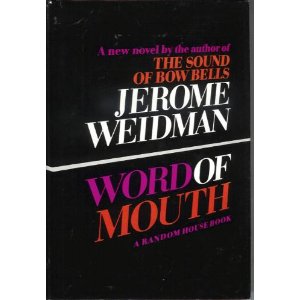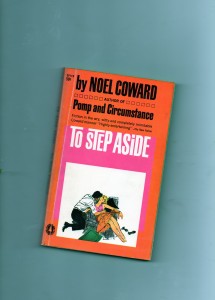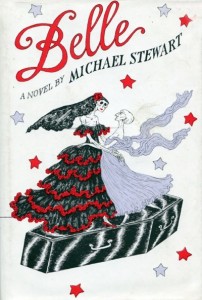It’d be unfair to suggest that Jerome Weidman was more of a musical-book writer than a more conventional book writer—I Can Get It for You Wholesale was a well-received novel before it inspired a musical. And it would be unfair to call a novel by Noel Coward an anomaly—he wrote several. But Weidman and Coward are best known as men of the theater. They, and Michael Stewart (whose books for Bye Bye Birdie, George M! and Mack & Mabel eclipse any writings he did in other formats) are men of the theater. They can’t write novels without betraying that.
Two of these book are directly about the theater. The other, Belle, is an unusual slow-paced suspense thriller about a 90-year-old society woman whose friends are dying off almost on a timetable while she lives on and on). They’re all mostly about the act of writing and the art of being famous.
Word of Mouth by Jerome Weidman (Random House, 1964)
“It is all settled,” Mr. Zucker announced at the other end of the wire. “There will be a clause in the contract that says if, at any time before the play arrives in New York, John Sayer decides he does not want the play to open on Broadway, all John Sayer has to do is serve written notice on the management, meaning Vincent Howe, in the form of a registered letter, and the whole project will be abandoned.”
John sat motionless in his study, staring out at the lights of Fifth Avenue on the other side of Central Park, listening to Ellie dropping ice cubes into his glass, thinking about what Mr. Zucker had said, and then, in a surprised voice, he said into the phone, “You mean I can stop the thing dead anywhere along the line?”
“Anywhere along the line,” Mr. Zucker said.
“When they’re in rehearsal?” John said. “when they’re on the road?”
“Anywhere along the line, Mr. Sayer, means anywhere along the line.”
“But by that time, if they’re in rehearsal, if they’re on the road trying out the show, large sums of money will have been spent,” John said. “Not to mention the time and effort everybody will have poured into it.”
“All true, Mr. Sayer,” the low voice murmured. “And all, if you choose to exercise your contractual right, all their tough luck.”
“Are they crazy?”
“No more so than most people who function in the arts,” Mr. Zucker said.
To Step Aside by Noel Coward (1939; Popular Library paperback edition 1961)
Aubrey Dakers at the age of twenty-seven was in the enviable position of having written a successful play and in the less enviable position of having eventually to follow it up with another. If not another play, a novel, or at least a book of short stories. His play Animal Grab had already run for over a year in London and showed every sign of continuing indefinitely. It had been hailed enthusiastically by the critics. He had been described as “A new star in the theatrical firmament.” “A second Somerset Maugham.” “A second Noel Coward.”
Belle by Michael Stewart (Macmillan, 1977)
“Now what have you written?”
“Novels. I should say a novel. One.”
“Only one? You look too old to have written only one. Maybe it was very thick.”
What the hell, don’t hide your light.
“It was called A Hundred Roses.”
“A Hundred Roses. I never heard of it.”
Suddenly she shrieked. “A Hundred Roses! With Gregory Peck! I saw it! That was you?”
“Not the screenplay. I only wrote the book.”
“But I read it, I gave it as a gift! That was you?”



